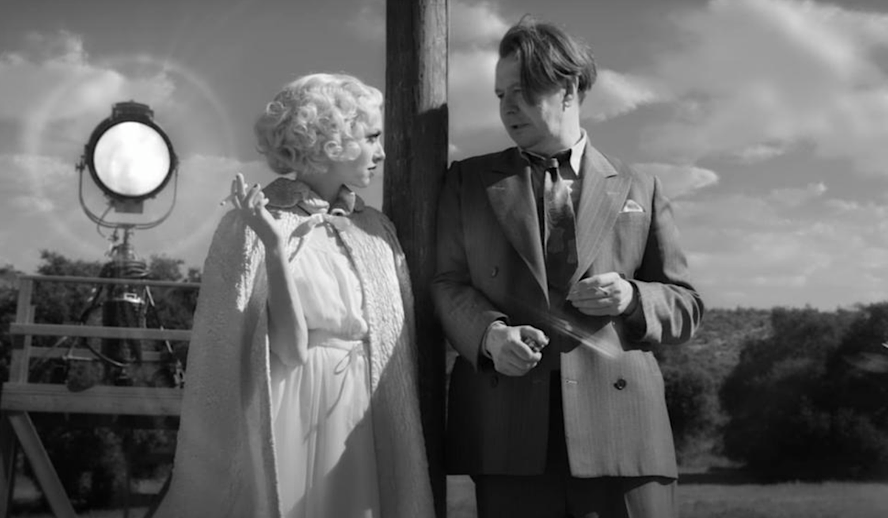Table of Contents

Photo: ‘Mank’/Netflix
Ask most cinephiles and movie critics what “the greatest movie of all time” is, and you’ll get different answers. But one of the most common would undoubtedly be Citizen Kane.
Released in 1941, the movie (produced, directed by, and starring Orson Welles) tells the epic rise-and-fall story of the incredibly wealthy and influential newspaper tycoon and industrialist Charles Foster Kane. It’s no secret, even back then, that the primary real-life inspiration for Kane was media baron William Randolph Hearst: such that Hearst leveraged his influence to try to prevent the movie from being made, as well as suppress its release. Still, the movie did well at the box office and its stature would only grow as the years went on. Critics and scholars hailed Citizen Kane for its innovative narrative structure and filmmaking techniques which would influence future movies for years to come, something even the film’s detractors can’t deny.
Related article: The Masters of Cinema Archives: Hollywood Insider Pays Tribute to ‘La Vie En Rose’, Exclusive Interview with Director Olivier Dahan
Related article: ‘The Social Network’: 10 Years Anniversary of the Film, Where Are Facebook Founders Now?
It’s worth noting that while the film was nominated for nine Academy Awards—including Best Picture, Director and Actor—it only won one for its screenplay, awarded to Welles and his co-writer Herman J. Mankiewicz. Such that the authorship of the screenplay has been a source of controversy in the past: influential film critic Pauline Kael wrote a controversial (and since discredited) essay arguing that Mankiewicz was the sole writer, with Welles trying to deny him screen credit.
Enter Mank, from director David Fincher, which tells the story of 1930s Hollywood and the writing of Citizen Kane from Mankiewicz’s point of view. On paper, it sounds like a dry subject matter, and it’s doubtful the film would reignite the authorship debate. And yet the end result is a film that’s ultimately a very compelling, entertaining, and even timely story of the ties between Old Hollywood and politics, with excellent directing and production values and great performances.
Subscribe to Hollywood Insider’s YouTube Channel, by clicking here.
“Ready and willing to hunt the great white whale?” — What Mank is About
By 1940, screenwriter, playwright, and former drama critic Herman J. Mankiewicz (Gary Oldman) has fallen on hard times; a gambler and heavy alcoholic, Herman (or “Mank”) is recovering from a car accident that’s left him immobile with a broken leg. A 24-year-old Orson Welles (Tom Burke) approaches Mank with an offer: he’s been given carte blanche by RKO Pictures to make his first movie about anything he wants with any collaborator he chooses, and he hires Mank to write the first draft of a screenplay. Welles puts Mank up in a remote ranch in Victorville, California, and gives him 60 days to write the script while recovering from his injuries—and to keep him away from drinking. During the writing process, Mank is aided and overseen by secretary and typist Rita Alexander (Lily Collins), nurse Fräulein Frieda (Monika Gossmann), and Welles’ producing partner John Houseman (Sam Troughton).
Through flashbacks Mank’s past is revealed, showing him in his prime as part of a group of on-staff screenwriters working for Paramount and MGM, and crossing paths with studio executives like Louis B. Mayer (Arliss Howard) and Irving Thalberg (Ferdinand Kingsley). At the same time, he also forms an unlikely friendship with actress Marion Davies (Amanda Seyfried), the mistress to the enigmatic Hearst (Charles Dance) with whom Mank also ingratiates himself until their falling out.
As Mank races to finish his script, those around him including his wife Sara (Tuppence Middleton) and his writer-director brother Joseph (Tom Pelphrey) see what the script is ultimately about—a scathing takedown of Hearst and his inner circle—and fear what it will do to his career.
Related article: The Power of Positivity: Ikorodu Bois + Chris Hemsworth + Russo Brothers + Sam Hargrave
Limited Time Offer – FREE Subscription to Hollywood Insider – Click here to read more on Hollywood Insider’s vision, values and mission statement here – Media has the responsibility to better our world – Hollywood Insider fully focuses on substance and meaningful entertainment, against gossip and scandal, by combining entertainment, education, and philanthropy.
Mank is a Great Reminder of David Fincher’s Directorial Prowess
Of the many directors working in Hollywood today, David Fincher is without question one of the true visionaries we have. Known for his fascination with dark and heavy stories, as well as his obsessive attention to detail and perfectionism, and stylish directing, he seems like an unlikely choice to direct a film about the writing of a screenplay. But this is actually a passion project for him, written by his late father Jack Fincher which adds a bit of poignancy to this.
As befitting all Fincher films, on a visual and technical level, this is a gorgeous film. In keeping with the idea of paying homage to Citizen Kane and Old Hollywood films, the film is wonderfully shot in black and white by cinematographer Erik Messerschmidt to match Kane’s look; this is also apparent in the use of noir-esque chiaroscuro lighting, a few low-angle shots, and deep focus. Fincher goes a step further in emulating classic 30s and 40s cinema by employing elements like muffled tinny audio, fade-to-black transitions, rear projection for driving scenes, film grain and scratches, and even fake reel change markers on the right-hand corner of the screen; he also adds his own stylistic flourish by frequently displaying screenplay scene headings designating the location and which timeline we’re in.
Related article: Hollywood Insider’s CEO Pritan Ambroase: “The Importance of Venice Film Festival as the Protector of Cinema”
It’s a testament to Fincher’s skill that he successfully pays homage to the retro filmmaking style while also making it feel fresh and his own, with support from Messerschmidt and editor Kirk Baxter, as well as the sumptuous costumes and production design from Trish Summerville and Donald Graham Burt respectively, and the jazzy period-authentic music score from frequent collaborators Trent Reznor and Atticus Ross. And the screenplay is witty, with some really crackling old-school dialogue.
Oldman’s performance as Mank is superb as he captures the alcoholism and caustic wit that makes him hard to deal with and yet charming and entertaining at the same time, with glimmers of thoughtfulness and vulnerability underneath. And Oldman is equally matched by Seyfried as Marion. The heart of the movie is arguably the friendship between Mank and Marion, and the scenes between the two of them are some of the best with Seyfried wonderfully conveying her character’s surprising savvy and intelligence, which is what draws him to her. The two are aided by a strong supporting cast, including an intimidating yet charismatic Dance as Hearst, Howard’s performance as a particularly loathsome Mayer, and Burke’s solid impression of Welles. With the exception of Marion, the other female characters don’t really have much to do although Collins and Middleton still deliver good work.
I also want to single out Collins and Pelphrey in that they near-perfectly nail the accent and diction and acting style one usually sees in actors in classic films; another sign of Fincher’s attention to detail.
Related article: 32 Facts of Venice Film Festival: Notable Points on Oldest & Most Prestigious Film Event and Oscar-Decider
Related article: Alfred Hitchcock’s ‘Rope’: A Masterclass in Suspense Cinema from Hollywood’s Golden Age
Not Just a Tribute — Mank is Also a Rebuke of Hollywood and its Impact
Despite what one might think, Mank is not so much about the writing process but more about the series of events that drove Mank the writer to pen what would be his masterpiece. And similar to the way Citizen Kane was structured, Mank also jumps about in time alternating between Mank’s past and his time at the ranch writing the script.
Fincher does a great job of nailing the seductive atmosphere of Old Hollywood: that experience of walking down the studio lot and seeing actors in costumes and crew members mill about—a reminder of the magic of filmmaking. It’s also quite fun seeing Mank and his fellow writers improvise their way through a pitch meeting for a horror movie they’re writing and just hanging out with each other.
But there is doom and gloom in the air: characters discuss the rise of Nazi Germany as the country grapples with the Great Depression. There’s a pretty scathing moment where Mayer convinces his actors and crew members to take pay cuts by convincing them that he cares about them. Later scenes with Mayer and other studio chiefs only further reveal their lack of scruples.
Related article: Five Iconic Golden-Age MGM Musicals Everyone Should Watch, Ranked
Related article: Martin Scorsese: 32 Facts on the Powerful Auteur of Cinema Synonymous with Hollywood
Mank is also surprisingly political as a key plot point in the film revolves around the 1934 California gubernatorial race between Republican Frank Merriam and Democratic socialist and writer Upton Sinclair (played by Bill Nye in a surprise cameo). While the studio executives and Hearst actively back Merriam, Mank, and a few others in his circle like what Sinclair stands for. Mank is later horrified when MGM and Hearst start producing fake newsreels in a smear campaign against Sinclair, especially as the idea came from an offhand remark he made to Thalberg. He comes to realize the impact moving images and motion pictures—the business which he’d been slumming through this whole time—can have in shaping public opinion and how it can be abused by people in power, a theme still relevant in our time.
Taking that into account, the act of Mank writing Citizen Kane almost becomes one that’s motivated by both revenge and the need for absolution, even if it means burning some bridges (though Mank repeatedly insists that Kane’s second wife, Susan Alexander, wasn’t meant to be based on Marion). And it’s why Mank insisted that he also be credited for the script: besides Kane being his best work, he wants Hearst to know that he was willing to stand up to him.
Related article: River Phoenix: 32 Facts on the Phenomenal Hollywood Icon & Legendary Superstar | A Tribute
Related article: The Top 5 Hitchcock Remakes: Analyzing the Remakes of Master Director Alfred Hitchcock’s Films
Conclusion
Admittedly, the subject matter is somewhat niche: it gets a bit inside-baseball in its exploration of Hollywood and politics in the 1930s. And viewers might get more out of the film if they’ve seen Citizen Kane. Nevertheless, this is an excellent film; it’s gorgeous, very well-acted, sharply written, and brilliantly directed. I can definitely see this getting some recognition or nominations come Oscar time.
Mank is now streaming on Netflix.
By Mario Yuwono
Click here to read Hollywood Insider’s CEO Pritan Ambroase’s love letter to Black Lives Matter, in which he tackles more than just police reform, press freedom and more – click here.
An excerpt from the love letter: Hollywood Insider’s CEO/editor-in-chief Pritan Ambroase affirms, “Hollywood Insider fully supports the much-needed Black Lives Matter movement. We are actively, physically and digitally a part of this global movement. We will continue reporting on this major issue of police brutality and legal murders of Black people to hold the system accountable. We will continue reporting on this major issue with kindness and respect to all Black people, as each and every one of them are seen and heard. Just a reminder, that the Black Lives Matter movement is about more than just police brutality and extends into banking, housing, education, medical, infrastructure, etc. We have the space and time for all your stories. We believe in peaceful/non-violent protests and I would like to request the rest of media to focus on 95% of the protests that are peaceful and working effectively with positive changes happening daily. Media has a responsibility to better the world and Hollywood Insider will continue to do so.”
Ways to support Black Lives Matter Movement to end systemic racism
More Interesting Stories From Hollywood Insider
– Want GUARANTEED SUCCESS? Remove these ten words from your vocabulary| Transform your life INSTANTLY
– Compilation: All James Bond 007 Opening Sequences From 1962 Sean Connery to Daniel Craig
– Do you know the hidden messages in ‘Call Me By Your Name’? Find out behind the scenes facts in the full commentary and In-depth analysis of the cinematic masterpiece
– A Tribute To The Academy Awards: All Best Actor/Actress Speeches From The Beginning Of Oscars 1929-2019 | From Rami Malek, Leonardo DiCaprio To Denzel Washington, Halle Berry & Beyond | From Olivia Colman, Meryl Streep To Bette Davis & Beyond
– In the 32nd Year Of His Career, Keanu Reeves’ Face Continues To Reign After Launching Movies Earning Over $4.3 Billion In Total – “John Wick”, “Toy Story 4”, “Matrix”, And Many More
Mank, Mank, Mank, Mank, Mank, Mank, Mank, Mank, Mank, Mank, Mank, Mank, Mank, Mank, Mank, Mank, Mank, Mank, Mank, Mank, Mank, Mank, Mank, Mank, Mank, Mank, Mank, Mank









